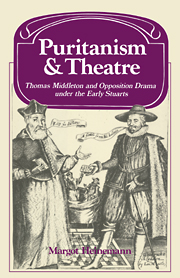Book contents
- Frontmatter
- Contents
- Introductory note
- 1 Time and Place
- 2 Puritanism, Censorship and Opposition to the Theatre
- 3 Middleton as Satirical Journalist
- 4 Early Satirical Comedies
- 5 How Anti-Puritan are Middleton's City Comedies?
- 6 Money and Morals in Middleton's City Comedies
- 7 Middle Years: Tragi-comedy and Moral Comedy
- 8 City Employments
- 9 Hard Times and Hengist, King of Kent
- 10 Political Satire: A Game at Chess
- 11 City Tragedy
- 12 Drama and Opposition, 1619–1640
- 13 From Popular Drama to Leveller Style: a Postscript
- Appendices
- Index
6 - Money and Morals in Middleton's City Comedies
Published online by Cambridge University Press: 03 November 2009
- Frontmatter
- Contents
- Introductory note
- 1 Time and Place
- 2 Puritanism, Censorship and Opposition to the Theatre
- 3 Middleton as Satirical Journalist
- 4 Early Satirical Comedies
- 5 How Anti-Puritan are Middleton's City Comedies?
- 6 Money and Morals in Middleton's City Comedies
- 7 Middle Years: Tragi-comedy and Moral Comedy
- 8 City Employments
- 9 Hard Times and Hengist, King of Kent
- 10 Political Satire: A Game at Chess
- 11 City Tragedy
- 12 Drama and Opposition, 1619–1640
- 13 From Popular Drama to Leveller Style: a Postscript
- Appendices
- Index
Summary
To see Middleton as merely ‘anti-citizen’ is an oversimplification. Villain-citizens in Middleton's plays, as in most Jacobean comedy, are more often moneylenders than mere merchants: for it was in this capacity that the powerful citizen most menacingly confronted the easygoing gentleman at the end of his resources. The mechanism which enabled a rich man to become richer purely by lending money, without obvious risk or industry on his part, was still regarded as something of a mystery at this early stage of capitalist development. Although medieval canon law had frowned on it, lending at interest had long been essential in the commercial economy, and had been accepted in practice for many years; and in the big merchant moneylenders, especially the goldsmiths, London had already the rudiments of a banking system.
Contemporary thought, however, still distinguished between necessary usury – to finance government or normal commerce, with interest to cover the risk – and what was known as biting usury, where the creditor charged excessive interest rates and was quick to foreclose on mortgaged land and property. This was considered to be exploiting the necessities of the poor craftsman or farmer, who could not survive a bad year without a loan, but had no hope of paying back much more than he had borrowed: or else as a deliberate attempt to twist gullible gentry out of their lands. It is significant that while Calvinist religious teaching had first legitimised interest, it was the popular Puritan preachers who inveighed most strongly against ‘biting’ usury – no doubt because their congregations consisted largely of the small men who were most likely to fall into debt-slavery.
- Type
- Chapter
- Information
- Puritanism and Theatre , pp. 88 - 106Publisher: Cambridge University PressPrint publication year: 1980

